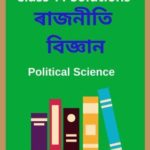Class 11 Political Science MCQ Chapter 3 Election and Representation Solutions to each chapter is provided in the list so that you can easily browse through different chapters Class 11 Political Science MCQ Chapter 3 Election and Representation Notes and select need one. Class 11 Political Science MCQ Chapter 3 Election and Representation Question Answers Download PDF. NCERT Political Science MCQ Class 11 Solutions.
Class 11 Political Science MCQ Chapter 3 Election and Representation
Also, you can read the NCERT book online in these sections Solutions by Expert Teachers as per Central Board of Secondary Education (CBSE) Book guidelines. AHSEC Class 11 Political Science Part – I and Part – II MCQ Solutions are part of All Subject Solutions. Here we have given NCERT Class 11 Political Science Multiple Choice Notes, Assam Board Class 11 Political Science Objective Type Solutions for All Chapters, You can practice these here.
Election and Representation
Chapter: 3
| (PART-A) INDIAN CONSTITUTION AT WORK |
| MCQ |
1. The minimum age required for being a voter in India is:
(a) 20 years.
(b) 18 years.
(c) 21 years.
(d) 25 years.
Ans: (b) 18 years.
2. Which Article of the Indian Constitution provides for free and fair elections?
(a) Article 324
(b) Article 326
(c) Article 329
(d) Article 325
Ans: (b) Article 326
3. ____________ does not influence people’s participation.
(a) Economic condition.
(b) Education.
(c) Inequality.
(d) Location (Rural/urban).
Ans: (d) Location (Rural/urban)
4. The body responsible for conducting elections in India is:
(a) Parliament.
(b) Election Commission of India.
(c) Supreme Court.
(d) Lok Sabha.
Ans: (b) Election Commission of India.
5. All citizens have right to:
(a) Stand for election.
(b) Become the representative of people.
(c) Both (a) and (b).
(d) None of these.
Ans: (c) Both (a) and (b).
6. The term Franchise means:
(a) Right to vote.
(b) Right to correct election.
(c) Right to hold public office.
(d) Right to form an association.
Ans: (a) Right to vote.
7. Which one of the following is directly elected in India?
(a) President of India.
(b) Vice-President of India.
(c) Members of Rajya Sabha.
(d) Members of Legislative Assemblies.
Ans: (d) Members of Legislative Assemblies.
8. The democracy is of two types:
(a) Direct/Indirect.
(b) Social/Economic.
(c) (a) and (b) both.
(d) None of them.
Ans: (a) Direct/Indirect.
9. What age is required for a candidate to stand for Lok sabha?
(a) 25
(b) 35
(c) 20
(d) 40
Ans: (a) 25
10. Elections provide opportunities for:
(a) Equality.
(b) Income.
(c) Employment.
(d) Participation.
Ans: (d) Participation.
11. Which of the following is NOT a qualification for becoming a member of the Lok Sabha?
(a) Must be a citizen of India.
(b) Must be at least 30 years of age.
(c) Must not hold an office of profit under the government.
(d) Must be registered as a voter in any constituency in India.
Ans: (b) Must be at least 30 years of age.
12. The Election Commission of India is a:
(a) Temporary body.
(b) Statutory body.
(c) Constitutional body.
(d) Advisory body.
Ans: (c) Constitutional body.
13. What is the minimum age for voting in India?
(a) 21 years.
(b) 18 years.
(c) 25 years.
(d) 16 years.
Ans: (b) 25 years.
14. Which Article empowers the Election Commission to supervise elections to Parliament and state legislatures?
(a) Article 326
(b) Article 327
(c) Article 324
(d) Article 330
Ans: (c) Article 324
15. Which electoral system is used for Lok Sabha elections in India?
(a) Proportional Representation.
(b) First-Past-the-Post.
(c) Mixed-Member Proportional.
(d) Single Transferable Vote.
Ans: (b) First-Past-the-Post.

Hi! my Name is Parimal Roy. I have completed my Bachelor’s degree in Philosophy (B.A.) from Silapathar General College. Currently, I am working as an HR Manager at Dev Library. It is a website that provides study materials for students from Class 3 to 12, including SCERT and NCERT notes. It also offers resources for BA, B.Com, B.Sc, and Computer Science, along with postgraduate notes. Besides study materials, the website has novels, eBooks, health and finance articles, biographies, quotes, and more.



